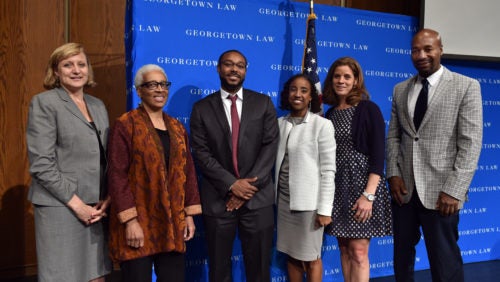Juvenile Justice Initiative Hosts “The Right to Remain Children: Race and Juvenile Justice 50 Years After Gault”
May 18, 2017

Professor Kris Henning (center right) led a panel on racial injustice with Lisa H. Thurau (Strategies for Youth), Judge Geraldine Hines (Massachusetts), Visiting Professor Justin Hansford, Visiting Professor Christy Lopez and Professor Paul Butler.
When Devontae Sanford was just 14 years old, he was arrested for murdering four drug dealers in Detroit, just around the corner from his home. He confessed to the crime, entered a plea on the advice of his former lawyer and served nearly nine years in jail.
But a hitman confessed to the murders just after Devontae’s sentencing — and the boy’s confession did not match the crime. The confession was coerced by police, and Devontae Sanford was innocent.
How did race impact this tragic story? “It played a big role,” said Sanford, who was exonerated and released from prison in 2016. “I told my attorney at the time I wanted a jury trial. He said, ‘You’re a poor black kid from the ghetto. These white people will come in from the suburbs and find you guilty…I was forced into taking a bench trial, something I didn’t even want to do.’”
Sanford spoke in Hart Auditorium May 16 at “The Right to Remain Children: Race and Juvenile Justice 50 Years After Gault.” As Dean William M. Treanor noted at the outset, the 1967 Supreme Court case affirmed the right to due process, including the constitutional right to defense counsel, for juveniles in delinquency proceedings.
But a half century later, the promise of In re Gault remains unfulfilled for youth of color — who are more likely than their white peers to be criminalized and treated as adults, sometimes for simply hanging out with friends or talking on a cell phone in class.
Professor Kristin Henning dedicated the symposium, sponsored by Georgetown Law’s Juvenile Justice Initiative and the National Juvenile Defender Center, to youth of color who are overrepresented in the criminal justice system and to those who died far too young.
“Today, 50 years after Gault, youth of color continue to be disproportionately suspended and expelled, arrested, processed in the courts rather than diverted, detained in secure facilities and transferred to adult court for prosecution,” Henning said. “As stakeholders on the front line, [we] cannot stand by and watch. All of us must stand up and fight against the criminalization of normal adolescent behavior in communities of color.”
Fighting racial injustice
Black children are policed like no one else in society, Henning said. So in a speech called “The Reasonable Black Child,” Henning asked what it might look like if race is factored into a Fourth Amendment “reasonableness” analysis — the consent to search, the seizure, reasonable suspicion and more. “The question is, whether or not [an] officer’s words would have communicated to a reasonable child…that he no longer has the liberty to walk away,” Henning said.
It was just one of the topics of “The Color of Suspicion: Fighting Racial Injustice”— a powerhouse panel that included Professor Paul Butler, Visiting Professor Christy Lopez and Visiting Professor Justin Hansford (L’07), who has been at the forefront of legal advocacy in Ferguson following the death of Michael Brown.
Other highlights included a talk by James Bell of the W. Haywood Burns Institute, who described a scene in the film “Moonlight” to explore issues of safety for youth of color. “There is very little in the human experience that is more fundamental than feeling safe,” Bell said.
Professor Jamillah Bowman Williams led a panel on bias that included a talk by UCLA Law Professor Devon Carbado. Emily Baxter of “We Are All Criminals” told stories of successful professionals who as teens got away with crimes that would have landed others in jail. Rebecca Epstein, executive director of Georgetown Law’s Center on Poverty and Inequality, appeared on a panel on “Black Girls Matter.” D.C. Attorney General Karl Racine explored the role of prosecutors as agents of change.
“Today, we celebrate the 50th anniversary of Gault — but we recognize that there is still much to be done to ensure that youth of color receive their constitutional rights,” Treanor said. The symposium, he noted, “will continue the transformative conversations that are required to combat racial injustice.”